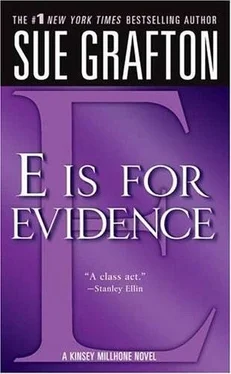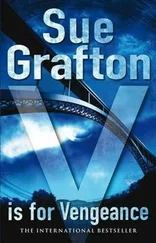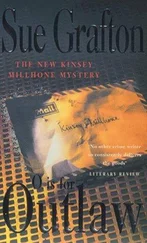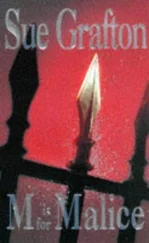I stirred restlessly. A palpable sexual vapor seemed to rise from his skin, drifting across to me like the scent of woodsmoke half a mile away. It's a strange phenomenon, but true, that in sleeping with men, none of the old rules apply to a man you've slept with before. Operant condi-tioning. The man had trained me well. Even after eight years, he could still do what he did best… seduce. I cleared my throat, struggling to break the spell. "What's the story on your therapist?"
"No story. She's a shrink. She thinks she can fix me."
"And this is part of it? Making peace with me?"
"We all have delusions. That's one of hers."
"Is she in love with you?"
"I doubt it."
"Must be early in the game," I said.
The dimple appeared and a smile flashed across his face, but it was mirthless, evasive, and I wondered if I hadn't touched on some pain of his. Now, he was the rest-less one, glancing at his watch.
"I got to get," he said abruptly. He gathered both plates and the silverware, toting dishes to the kitchen. He'd cleaned up while he cooked, an old habit of his, so he didn't have much to do. By 7:00, he was gone. I heard the thunder and rattle of his car as he started it and pulled away.
The apartment seemed dark. Extraordinarily quiet.
I locked up. I took a bath, keeping the water away from my burns. I closed myself into the folds of my quilt and turned out the light. Being with him had brought back the pain in fossil form, evidence of ancient emotional life, embedded now in rock. I studied the sensations as I would some extinct subspecies, for the curiosity, if nothing more.
Being married to a doper is as close to loneliness as you can get. Add to that his chronic infidelity and you've got a lot of sleepless nights on your hands. There are certain men who rove, men who prowl the night, who simply don't show up for hours on end. Lying in bed, you tell yourself you're worried that he's wrecked the car again, that he's drunk or in jail. You tell yourself you're worried he's been rolled, mugged, or maimed, that he's overdosed. What really worries you is he might be with someone else. The hours creep by. From time to time, you hear a car approaching, but it's never his. By 4:00 A.M., it's a toss-up which is uppermost in your mind-wishing he would come home or wishing he were dead.
Daniel Wade was the one who taught me how to value solitude. What I endure now doesn't hold a candle to what I endured with him.
The memorial service for Olive was held at 2:00 P.M. on Sunday at the Unitarian Church, a spartan ceremony in a setting stripped of excess. Attendance was limited to fam-ily and a few close friends. There were lots of flowers, but no casket in evidence. The floors were red tile, glossy and cold. The pews were carved and polished wood, without cushions. The lofty ceiling of the church lent a sense of airiness, but the space was curiously devoid of ornamenta-tion and there were no religious icons at all. Even the stained-glass windows were a plain cream with the barest suggestion of green vines curling around the edges. The Unitarians apparently don't hold with zealousness, piety, confession, penance, or atonement. Jesus and God were never mentioned, nor did the word "amen" cross any-body's lips. Instead of scriptures, there were readings from Bertrand Russell and Kahlil Gibran. A man with a flute played several mournful classical tunes and ended with a number that sounded suspiciously like "Send In the Clowns." There was no eulogy, but the minister chatted about Olive in the most conversational of tones, inviting those congregated to stand up and share recollections of her. No one had the nerve. I sat near the back in my all-purpose dress, not wanting to intrude. I noticed that sev-eral people nudged one another and turned to look at me, as if I'd achieved celebrity status by being blown up with her. Ebony, Lance, and Bass remained perfectly com-posed. Ash wept, as did her mother. Terry sat alone in the front row, leaning forward, head in his hands. The whole group didn't occupy more than about the first five rows.
Afterward we assembled in the small garden court-yard outside, where we were served champagne and fin-ger sandwiches. The occasion was polite and circumspect. The afternoon was hot. The sun was bright. The garden itself was gaudy with annuals, gold, orange, purple, and red marching along the white stucco wall that enclosed the churchyard. The stone-and-tile fountain plashed softly, a breeze occasionally blowing spray out onto the surround-ing paving stones.
I moved among the mourners, saying little, picking up fragments of conversation. Some were discussing the stock market, some their recent travels, one the divorce of a mutual acquaintance who'd been married twenty-six years. Of those who thought to talk about Olive Wood Kohler, the themes seemed to be equally divided between conventional sentiment and cattiness.
"… he'll never recover from the loss, you know. She was everything to him…"
"… paid seven thousand dollars for that coat…"
"… shocked… couldn't believe it when Ruth called me…"
"… poor thing. He worshiped the ground she walked on, though I never could quite see it myself…"
"… tragedy… so young…"
"… well, I always wondered about that, as narrow as she was through the chest. Who did the work?"
I found Ash sitting on a poured-concrete bench near the chapel door. She looked drawn and pale, her pale-red hair glinting with strands of premature gray. The dress she wore was a dark wool, loosely cut, the short sleeves making her upper arms seem as shapeless as bread dough. In an-other few years she'd have that matronly look that women sometimes get, rushing into middle age just to get it over with. I sat down beside her. She held out her hand and we sat there together like grade-school kids on a field trip. "Line up in twos and no talking." Life itself is a peculiar outing. Sometimes I still feel like I need a note from my mother.
I scanned the crowd. "What happened to Ebony? I don't see her."
"She left just after the service. God, she's so cold. She sat there like a stone, never cried a tear."
"Bass says she was a mess when she first heard the news. Now she's got herself under control, which is proba-bly much closer to the way she lives. Were she and Olive close?"
"I always thought so. Now I'm not so sure."
"Come on, Ashley. People deal with grief differently. You never really know what goes on," I said. "I went to a funeral once where a woman laughed so hard she wet her pants. Her only son had died in a car accident. Later, she was hospitalized for depression, but if you'd seen her then, you never would have guessed."
"I suppose." She let her gaze drift across the court-yard. "Terry got another phone call from that woman."
"Lyda Case?"
"I guess that's the one. Whoever threatened him."
"Did he call the police?"
"I doubt it. It came up a little while ago, before we left the house to come here. He probably hasn't had a chance."
I spotted Terry talking to the minister. As if on cue, he turned and looked at me. I touched Ash's arm. "I'll be right back," I said.
Terry murmured something and broke away, moving toward me. Looking at him was like looking in my mirror… the same bruises, same haunted look about the eyes. We were as bonded as lovers after the trauma we'd been through. No one could know what it was like in that mo-ment when the bomb went off. "How are you?" he said, his voice low.
"Ash says Lyda Case called."
Terry took my arm and steered me toward the en-trance to the social hall. "She's here in town. She wants to meet with me."
"Bullshit. No way," I whispered hoarsely.
Terry looked at me uneasily. "I know it sounds crazy, but she says she has some information that could be of help."
Читать дальше












